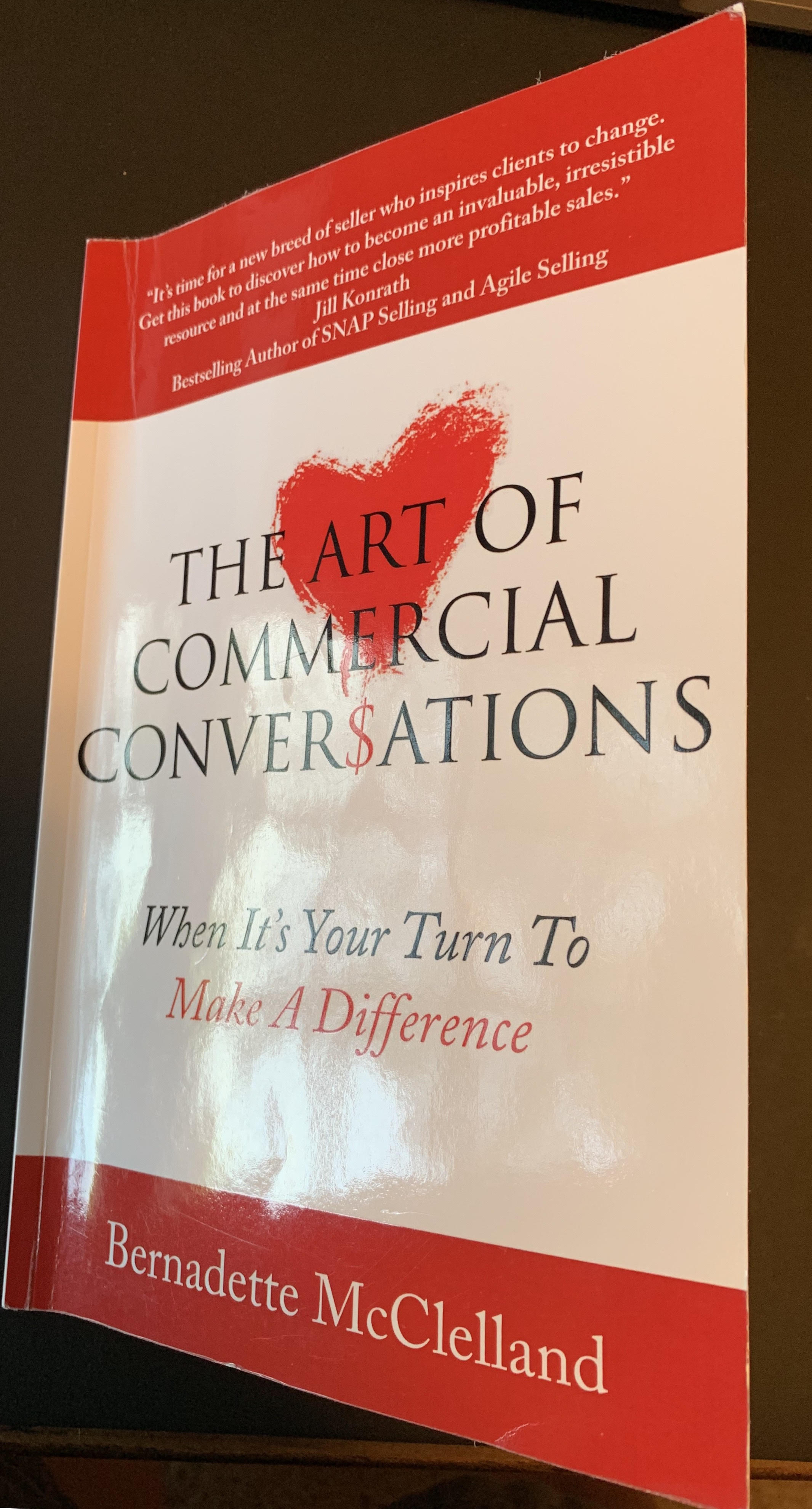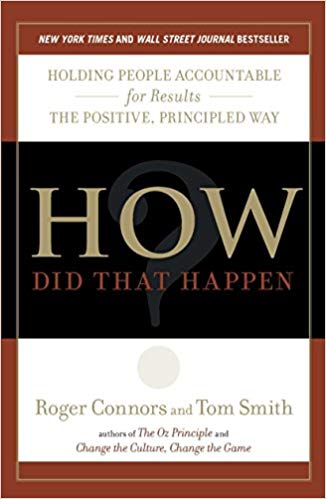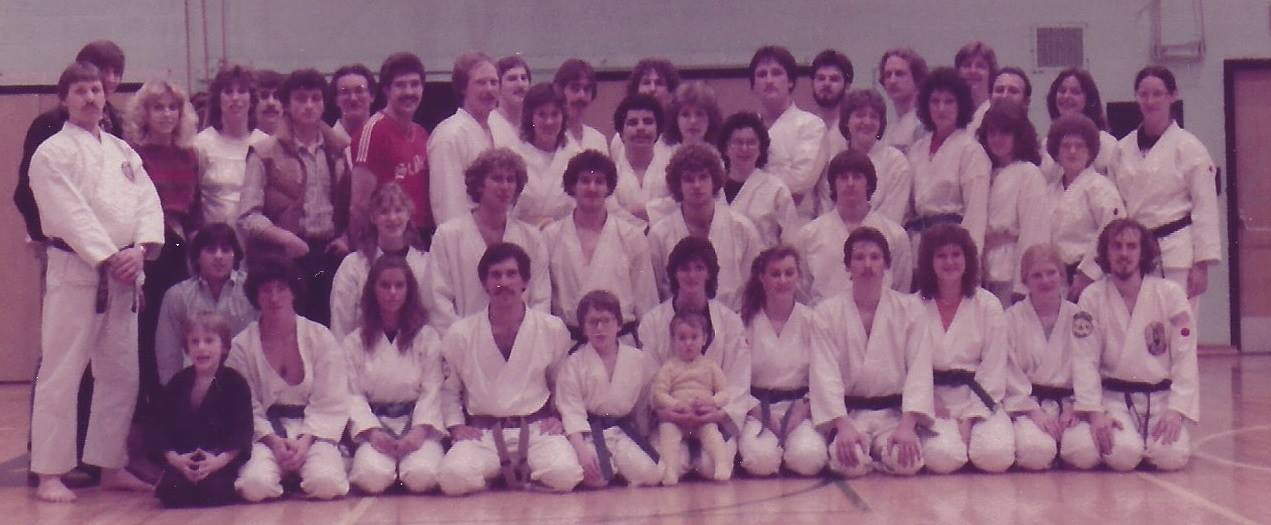Are your Salespeople Prepared for Commercial Conversations with Customers and Themselves ?
Each day salespeople are meeting with current and prospective customers and their value is determined by how well they communicate effectively. The challenge is: Are your salespeople trained and prepared to have commercial conversations? In a recent study by Florida State 85% of buyers surveyed shared they expect salespeople today to connect the dots between what they are selling and the value to the buyer’s company. Sadly, the same survey determined only 15% of salespeople communicate value the buyer will realize. This is a common sales problem we need to fix. In this post we will discuss what commercial conversations are and how your salespeople can apply the advice of author Bernadette McClelland in her book: The Art of Commercial Conversations.
“Your enterprise value is a product of what your salespeople say, and how they sell each day”
- Mark Allen Roberts
I recently attended an excellent AA-ISP conference in Chicago for inside salespeople. In one of the break out workshops I met Bernadette and was immediately engaged with her message and content. In her workshop she shared statistics how buyers today expect sellers to be skilled in commercial conversations.
Having been the sales training manager for a $4 billion company this was not new news. We strategically blended communications skills courses throughout our six-month training program. We included courses like value-based sales and how to build business cases, presentation skills, entrepreneurial skills, business acumen, and many more skills development courses. However, Bernadette’s content also discussed a missing element: the conversations salespeople are having with themselves each day. I found this topic fascinating.
French philosopher Rene Descartes said “I think therefore I am”
Could this impact sales results and I failed to include it in our training? Absolutely!
What do your salespeople think about?
What are their beliefs about sales and selling?
What are their motivations as well as fears?
Let me ask you a few questions from the book:
- Are sales today easier or more complicated than they were in the past?
- Do you feel buyer expectations of salespeople has changed in the last 10 years?
- Do you think it is easier or harder to get appointments with buyers today?
- Are you seeing more or less people involved in and influencing the sale today?
If you are like me you will agree you have experienced huge changes in how buyers buy, what criteria they are using today and how many people are involved in the buying decision. Buyers expect and reward a different type of seller today. As I have shared in the past, they want Trusted Advisors not reps.
The author does a wonderful job of explaining where sales has been and where we are now.
Sales 1.0 – Contact, Content exchange, Contract
Sales 2.0 – Connect, Consult, Conspire
Sales 3.0- Conviction, Context, Contribution
It should not shock us that 57% of sales reps failed to achieve quota in 2018 and the number is growing each year. Salespeople who do not understand the voice of their customers and are selling like they did 10, 15, or 20 years ago are failing. Buyers are rebelling and not giving them appointments, or they go dark after the first appointment. As the author shares in this excellent quote:
“Byers have found their voice and they are voting with silence”
Buyers are more distracted than ever before, harder to reach and quite frankly are having far too many calls with salespeople prisoners to outdated sales processes. More sales are lost today to the status quo than to competitors.
Buyers are in charge and they have been trained. Over 70% of buyers have received formal negotiations skills training and less than 10% of sellers have been trained in negotiations. Should it shock us when we dee sale price discounts and overrides occurring in over 60% of the sales transactions today? The sad reality is 50% of salespeople today have never been trained. If they were trained it was in a one and done instructor led experience and not spaced over time online.
So, buyers are trained, most salespeople are not, and sales VPs are frustrated salespeople are selling on price. That is the reality I hear each day and a sales problem we need to fix.
The author recommends we reassess our approach to sales and how we sell and even why we sell.
Simon Sineck has done some incredible work on knowing your why. If you have not seen this click here. He shares how people don’t buy what you do but why you do it.
“It’s not just about value-driven commercial conversations but values driven conversations that are going to cause our buyers to be more curious about what we do.”
- Bernadette McClelland
We must help salespeople shape the conversations they have with themselves on their why they sell.
What’s your Why?
What is your Companies’ Why?
The key is crafting your relevant personal message. The author shares…
“48% of B2B decision makers do not respond to sales professionals who don’t personalize their message”
We must train salespeople to have commercial conversations, build their personalization skills and learn the art of storytelling.
“78% of buyers surveyed did not belie sellers have case studies, metaphors, analogies, or stories to tell that are relevant to buyers”
Ouch!
The author closes her book with a challenge, and I want to give you and your sales team that same challenge.
How much time do your salespeople currently dedicate to the following behaviors?
Creating a Vision
Knowing who your buyer is
Emotional awareness- knowing buying criteria important to buyer
On the ball – able to answer questions quickly and accurately about products, features, benefits and how to do business with your company
Demonstrating they know your market, Product, value your product provides customers
Look the part
Have an open mind and actively listen
Build trust
Attention to detail
Understand customer expectations
Design and communicate plans with customers
Strategically keep in touch with customers
Create customer advocates
Build a relationship matrix in key accounts beyond buyers
Clearly know and can articulate your value
How about your sales team?
Do you know their commercial conversations skills?
Do you train your salespeople to have meaningful commercial conversations?
Is your salesperson’s day filled with transactional activity of value producing behaviors highlighted above?
I highly recommend The Art of Commercial Conversations by Bernadette McClelland to help fix sales conversation problems your salespeople are having with customers and themselves each day.
Accountability is not a 4 Letter Word When Fixing Sales Problems
Are your salespeople accountable? When I ask you that question what is the first thing, first emotion, you feel? Why do you think that is? Did less than 60% of your salespeople hit or exceed their sales goals last year? Has someone on your senior management team said: “ we need to hold our salespeople more accountable “? How do we improve accountability and achieve the profitable sales growth we want and need?
If you have experienced discussions about sales accountability lately this post is for you and your team and you all need to read: How Did That Happen by Roger Connors and Tom Smith of the Performance Group.
I was asked to help a company whose sales had stalled for the last five years. In the first senior management team meeting I attended I heard:
The furious young President and CEO shared: “We need to hold our regional sales managers accountable to their growth goals”
Marketing quickly chimed in: (or threw kerosene on the fire…you pick): “Why can’t our salespeople follow up on the good leads we send them, if they did we would be hitting our numbers?”
Engineering decided they had best pile on: “Why can’t sales sell the innovative new products and features we launched”?
Which triggered the CFO to look up from his laptop and share: “ We need to start getting a return on all the investments we made to grow this business”
The COO needed to contribute; “Why can’t sales provide accurate forecasts? Its killing our manufacturing efficiencies, inventory costs and on time shipment goals”?
The Partner from the Private Equity Firm who is now attending meetings due to poor financial performance added: “ When will we see results? What specifically are you doing to turn these results around? Do we have the right salespeople?”
Their HR Vice President added: “Our salespeople who work from their homes need to stop cutting their grass and golfing and get out in front of customers and make some sales, they need to put in 12-15 hour days like we do”
I wish this was a rare meeting and the comments were unusual…but they were not and unfortunately I have heard the above or something similar with many of my past clients. Everyone assumes the solution is sales just needs to work harder and become more “accountable”. Some managers assume salespeople hate to be held accountable, as if it will somehow hurt their motivation. Nothing could be further from the truth.
“Top Performing Salespeople Hold Themselves Accountable”
– Mark Allen Roberts
The reality is top performing sales super stars love to be held accountable and serve on teams of accountable leaders. Sales super stars are like elite athletes. They are very competitive, they train relentlessly, and they are always learning and practicing their craft. From my observations over the past 35 years, most elite salespeople were athletes and now sales is their sport. Top performing salespeople own their goals and strive each day to hit their objectives and drive profitable growth for their organizations.
So where’s the disconnect? …And more importantly how do we fix this problem quickly?
The authors of How Did This Happen do an excellent job of explaining that accountability has two sides:
Taking Accountability For Yourself
Holding Others Accountable
What we often quickly assume, as the team above thought was a sales accountability problem is actually an organization wide accountability issue. (Sorry) While all of your team is firing missiles from their silos, the true problem is your entire organization lacks a culture of accountability and this must be corrected.
Have you ever worked for someone who assigned you very specific objectives and held you accountable to your goals but they never follow up on emails, signatures needed, budget approvals and other tasks they committed to? How did that make you feel? Were you more or less motivated to achieve your objectives?
So if our manager is accountable it impacts our performance? ….Absolutely!
The good news is your team is motivated by meaningful work. They want to help the organization grow profitability and in the process contribute and one day retire from your organization.
The elite salespeople are accountable. They are out everyday hunting for opportunities to serve your current customers and searching for new accounts with problems your organization solves.
Still doubt your salespeople are accountable?
Let me ask you a few questions…
Where else in your organization are people as accountable as your salespeople?
- Their sales are tracked real time, you can see their activity and results
- You can see what they plan to do next in the CRM
- You can read what happened in the last meeting in the CRM
- In your weekly call in meetings they share what they set out to do, what they did, what they will do and what help they may need from you
- You can see who they are selling, what they are selling them and at what price
- You get reports showing profit by customer, salesperson, region, district, country (there is no hiding in sales)
- Their expense reports tell you if they are making good decisions based on return on investment, if they are managing their time appropriately and you can see where they have been and how long they were there
- They often do weekly call reports
- You complete customer surveys and ask about their service
- Other executives attend customer meetings with them
- If they do not make the sales to achieve their sales goals they do not make the targeted income they were promised
So again, are you sure you have a sales accountability problem?
The book: How Did This Happen is brilliant!
It introduces the concept of an accountability sequence that is broken down into two parts.
The first half is the outer ring as they call it. Here is where you form, communicate, align and inspect expectations. This is where most managers fail. This step is about your managers setting clear reasonable expectations.
The second half is the inner ring where you engage in accountability conversations in a professional way to deal with unmet expectations. (Emphasis on words professional way)
What I enjoyed most about this book is it sets the tone to lose all your emotional assumptions about accountability and it teaches you how to be and lead your teams in a professional and accountable way.
This book provides many tools and assessments to help you determine where your team is in the competency of accountability and guides you how to improve.
The book shares five reasons people do not hold others accountable:
- Fear of offending someone or jeopardizing a personal relationship
- The feeling they lack the time to follow up
- A lack of faith that the effect will make a difference
- A worry that by holding someone else accountable their may expose their own accountability failures
- A reluctance to speak due to fear of potential retaliations
(Did any of the above resonate with you and your team?)
Lets get back to the small company. The senior management team meeting ended and the CEO and CFO asked I stay in the room. They were concerned I was taking notes but did not offer any advice or solutions. I shared I have a process and I have noted everyone’s concerns assumptions and perceptions and now I need the voice of your customers and your salespeople and we will develop a strategy to improve your bottom line results.
What did I find after spending just under six months in the market traveling with their salespeople and and doing voice of customer interviews with top distributors and end customers?
- Customers openly shared how difficult the company was to work with
- Their order follow up was poor and orders often had pricing errors
- On time delivery was under 60% hurting distributor relationships with their customers
- Their product was plagued with quality issues resulting in warrantee claims
- Warranty claims just after purchase negatively impacted distributor relationships with end users
- New products over the past 5 years were historically launched before they were ready. Distributors now wait at least 18 to 24 months before buying new products because they feel the company will have “worked all the bugs out by then“
- Their salespeople, regional managers and distributors were never trained in commercial selling skills
- Their salespeople were exhausted and spending more time of tracking late orders and warranty parts than selling
- Their customer service team was never trained and over 70% of incoming calls went to voicemail
- Their sales compensation plan was so complicated their salespeople did not understand it, trust it, and often found the company made errors in their commissions and it often took over 90 days to correct them
Did this company have a sales accountability problem or a company wide accountability issue?
In chapter 9 the authors give you a simple yet brilliant model to assess accountability. It starts with asking: Is the person above or below the line
Above the line
- Do it
- Solve it
- Own it
- See it
Below the line
- Wait and see
- Cover your tail
- Blame others and finger point
- “Not my job”
Accountability is not a 4-letter word to elite salespeople. They hold themselves accountable and they must know you are accountable as well. They are constantly training, learning and practicing to improve their skills.
We must also understand accountability moves above and below the line for your people ( and yourself) . Once you have read this book you will quickly identify when a victor has become a victim and you are provided tools to help coach them to get them back on track.
I highly recommend you add this book to your library, read it, share it among your leadership team then share it with your sales managers and salespeople.
As for the company above…their sales grew from $14 million to over $80 million in the next 6 years once everyone understood their customers expectations and aligned their strategies and goals to achieve them. We became customer centric and when we did the silo’s went away. We all shared cross functional goals and the bottom line became healthy. So healthy they were acquired a few years later.
I saved the tough questions for last.
How accountable is your team?
How accountable are your salespeople?
Has anyone on your team said: “Our salespeople need to be more accountable”?
How accountable are you?
If the last question hit a nerve then you really need to read this book and help your team understand what accountability is and how to hold others accountable in a professional way. We all drift above and below the line of accountability. This book helps you identify it sooner and provides many tools and coaching ideas to getting your team back on course to profitable performance.
Increase Sales: Fix Broken Windows in How Your Team Sells
Is your sales team prepared to win and achieve their sales goals today? Do your salespeople consistently exhibit the discipline to drive profitable sales growth? Do your salespeople clearly understand your expectations and they are accountable to them? One way to ensure your sales team breaks the growing global trend of sales teams not achieving sales growth goals is to fix broken windows in your sales organization. In this post we will discuss where to look for broken windows that are hurting your sales performance.
I am very thankful to a number of my mentors over the years. They taught me how to capture and leverage the voice of the customer and how to serve customers by providing industry insights and best practices to improve their bottom line. One mentor taught me how to listen, actively listen for unresolved problems. Mentors help salespeople understand the discipline required to drive profitable sales growth and to be accountable for key behaviors that if performed consistently will drive profitable sales growth. Having disciple and being accountable is not about doing 1,000’s of things perfectly. Being accountable and having discipline is about is having clear goals and expectations on how you will achieve those goals. As the sales leader it is about inspecting what you expect and understanding the behaviors and attitudes to support key goals.
I am very proud of my children. My dream for my children was I would grow a business and give it to them one day to run. In running the business they would learn the life lessons I experienced and have financial freedom. I discovered about 15 years ago this was only my dream. My children had much different plans. My daughter became an amazing artist and now is the social media marketing manager for a company driving 3-5 times the traffic to their trade events and website leveraging her artistic skills creating innovative content. My son has a burning desire to serve and protect others and a police officer.
Over the holidays my son and I were talking and he shared something called “Broken Window Theory” and I thought it was fascinating. Broken window theory suggests that visible signs of crime like cars stripped and up on blocks in the street, street signs missing, traffic lights not working, people consuming alcohol in public and other anti- social behaviors create an environment for more crime and more serious crimes. The theory suggests that policing methods that target minor crimes such as vandalism, public drinking and others create an atmosphere of order and lawfulness, thereby preventing more serious crimes.
In the 1969 a psychologist named Philip Zinbardo from Stanford ran an experiment. He parked a car with no license plates in two neighborhoods. One that was run down, broken windows and signs of crime and one in an affluent neighborhood in Palo Alto California. The car parked in the run down neighborhood was vandalized within 10 minutes. Next he smashed the front window and what he observed surprised him. Others in the neighborhood with vandalism and other crimes joined in and within 24 hours the entire car was stripped to the frame. Who did the vandalizing is what was disturbing: It was respectable adults in the community often with their children not …street gangs.
The car in Palo Alto remained untouched.
The findings from the study?
Unintended behavior leads to a breakdown of community controls
One broken window leads to many if left unaddressed
Disorders drives fear and withdraw from community laws and norms
Even the best citizens in a community can start bad behaviors if the behaviors are left unchecked
My son has been a police officer in a large city now for a number of years. He has personally experienced how policing and correcting what seems like minor misdemeanor crimes helps bring a neighborhood back to life. He has seen the impact having the discipline to enforce common community norms and expectations that support a safe and prosperous community and how this reduces crime significantly.
“Ok Mark, this is all interesting … but how does this apply to driving profitable sales increases year over year?”
I thought you would never ask!
How many broken windows exist in your company’s sales organization?
Do you know where to look?
The good news is you have a good smart team and there are many things about your company you and your team should be proud of. When I did business development consulting work I asked a lot of questions and looked for broken windows that are signs of much bigger sales problems to be solved. It is not unusual for my past clients to not even see the broken windows they walk by each day. Many broken windows have been broken for years and they became “ how we do things around here”. New team members will see them immediately but if they want to survive they learn to look the other way. Instead of repairing the broken windows teams try to just cover them up.
Let me help you see the broken windows that I have seen because you too may have grown accustomed to seeing them and may walk by them everyday and they are hurting your business development and sales growth efforts…
Majority of salesperson’s time spent in non-sales activities
“Hi how are you meetings” …Salespeople bringing donuts to their distributors with no other business reason for the visit, no one at the distributor even knew you were coming
Not being properly groomed
Company car dirty inside and out
Not making eye contact with customers in meetings
Sales people not taking notes in meetings
Salespeople not having a pen visiting a customer job site and having to “remember” the requirements
No pre-call plans
No CRM entry for future meetings or past meeting notes
Outdated company brochures in sales associate’s vehicles
Damaged and stained brochures from not being properly stored used in customer presentations
Poor or no customer follow up
Not following up on leads provided, QDD disorder
Salespeople leaving sales training to make/ take phone calls
Customer email not responded to in 24 hours
Salespeople working on laptops in meetings and not paying attention
Missing team weekly meetings
Salespeople openly criticizing others on sales team, others on other teams ( not constructive criticism )
Not responding top your email of voicemail in 48 hours if you asked them to
No plan to achieve their sales goals
Showing up late to weekly meetings
Salespeople playing feature and benefit bingo
Not being prepared for weekly meetings
No cadence for how often they visit with each customer
Not completing expense reports timely
Poor interpersonal exchanges with team members from other business groups
Talking too much in meetings with customers
Salespeople who have never been trained in sales (product-yes, sales-no)
Not understanding their customers’ businesses
Not understanding their market or market language
No dollar value in CRM for new opportunities identified
Not understanding how your product or service impacts your customers’ bottom line
Not qualifying potential customers
Salespeople seen as just another rep not a trusted advisor
Salespeople not spending the majority of their time in sales behaviors
Not updating sales stage in CRM
Asking poor questions in meetings
Poor listening, talking over customers
Selling on price not value
No ideal customer profile so everyone could be a customer
Company vehicle not maintained
Poor to no relationships at key customers
Key account budgets/goals… but no strategic growth plans on how to achieve them
Only knowing the buyers at key accounts no relationship with other influencers
Sales pipeline bucket not a funnel
Poor new product sales
Poor sales customer visit trip planning (more time driving and flying than in front of customers)
Salespeople staying at very expensive hotels
Salespeople submitting very expensive dinners without customers
If you see some of the above you have broken windows that need to be repaired before your team can experience explosive sales growth.
The above are some broken windows I have observed but there are plenty more I am sure.
How about you…
What broken windows have you observed in your sales teams that are negatively impacting your profitable growth plans?
Do you have associates in key sales leadership roles that have not been trained to lead salespeople?
Are their politically incorrect secrets that your salespeople know but are afraid to discuss?
If we allow broken windows in how we sell they hurt our ability to drive profitable sales growth and increase shareholder value. We are not saying everyone has to be perfect and 1,000’s of things. What we are saying is we need discipline and accountability in our sales teams. As the leader you need to set the expectation and insure compliance. If you observe a behavior that is not consistent with what your team has identified as your core values you must be safe to address it and correct it. If not the little broken windows become chaos and good team members in your sales community will start behaving in ways counter to driving profitable growth.
In our next post we will discuss common marketing broken windows to look for and repair.
Grow Strategic Account Sales and Profits with Needs Assessments
How many of your key strategic accounts grew more than 25% last year? How many active opportunities at large key customers is your team working on? How proficient is your sales team at conducting a needs assessment with your key strategic accounts? Is this something your key account managers do frequently, on going or once per year? The needs assessment is the next key piece of the puzzle in fixing key account sales problems. Everything after needs assessment is about solving the problem identified in needs assessments with solutions you can provide.
I was asked to help a family run business fix a sales problem. They just learned they lost a large amount of sales at their top account and this account represented over 20% of the total revenues. This large account was their anchor account. It gave them the ability to negotiate competitive raw material purchase agreements. It gave their plants manufacturing efficiencies. Their president asked me to lunch to share the sales problem and discuss how I can help.
Very quickly the discussion turned to how do we target and new accounts to make up for this huge unexpected loss.
He was asking me a lot of questions:
How do you determine new accounts to target and why?
How long will it take to open and grow these accounts?
How many accounts do you think we need to target to make up for the recent sales loss we just experienced?
Where do we get new account lists and how much should we expect to pay for them?
How do you suggest we structure our team so we are focused on bringing in new business?
What compensation plan designs have you used to drive net new customers?
I heard you are good at finding and opening new markets for current products? How long does that process take?
I see you have experience helping companies grow internationally? What does that process look like and how long will that take?
I said I would be happy to answer all these questions and more but first tell me more about the large anchor account you lost.
He shared:
We have served this customer for over 40 years and I thought we had a great relationship. They have toured our facilities over the years, we have supplied them high quality products and we have a strong relationship with the buyer. Every year we helped support their company golf outing and global sales meeting and trade shows. We have invested in new production equipment and processes to meet their growing demands over the years.
So what happened? Why did you lose the business?
We received their projection for the next calendar year and we noticed the majority of the key products we supplied them were not on the projection. We called and asked our buyer and she shared they were no longer manufacturing the machines those parts supported but there will be some small aftermarket orders. We did nothing wrong their business and market changed and unfortunately the bulk of what we supplied them was for products they were discontinuing based on their customer feedback.
How do you manage large accounts like this?
We have teams of people that keep this customer happy in quality, production, design and so on. We have a strong engineer who has been with our team for over 25 years who manages this account from our corporate office and he has one of the top independent representative firms, the firm that opened the account for us years ago and services the account.
When was the last time your team did a needs assessment for this customer?
[Silence …and I let is hang there as long as he would let it while I enjoyed my salad ]
Well …as I said we have serviced this customer for years and the buyer as well as his design team has been in our facilities. They know what we do. I can assure you if there was a project they were working on we could have helped them with it would have come our way.
How often do your salespeople conduct key account needs assessments? Is it an ongoing process or something they do with accounts early each year?
I am not sure, I assume we are always listening for problems we can solve but I will have to get back with you.
But lets get back to my questions, how long is it going to take to make up these lost sales, I owe our owners and our board a plan.
A key part of any key account management process is constantly assessing needs and designing solutions to solve customer challenges. Many key account managers are excellent at building and leveraging relationships in accounts and managing large amounts of data to give the customer excellent service with their orders. Where they often feel uncomfortable and fall short is asking for unresolved problems. They worry these questions may somehow hurt their relationship when in reality solving customer unresolved problems builds their relationships to that of trusted advisors.
Where a number of teams struggle is in needs assessements.
We need to be asking questions and finding customer unresolved problems and the problems we find become our future sales growth opportunities to fuel our future profitable sales.
We need to build relationships wide and deep in our key accounts so we have our ear to the ground constantly listening for problems that need to be solved.
Our key strategic account managers need to be able to share stories, success stories we have with other similar accounts to open opportunities at their accounts by often challenging the way we do things around here.
If your team needs questions to ask, there are a number of places you and your team can find questions to have meaningful conversations with customers to discover unresolved problems at your key accounts.
MTD Sales Training published 450 sales questions
Hubspot Published questions
Mycustomer published 100 questions to uncover customer needs.
The sales Blog published great questions to determine customer needs.
The Center for Sales Strategy Posted questions here and here.
Once your team finds 5 questions they feel comfortable saying they will need to customize them to your customers and products and or services.
The sales process revolves around what you do, what you learn and what you find in needs assessments.
Every customer situation will have different requirements for needs assessments.
To make the questions more powerful, follow questions with suggestions (trial solutions) about what might solve the problem based on similar customer success stories. This technique could sound like this:
ARJ Corp had a similar had a situation, and they used our 132457 products and it resulted in saving them over $160,000 per year….do you think that might work well here for you?
By offering these success story examples of how you have helped other similar customers with similar problems as a part of your needs analysis questions, you are getting your customers to think creatively while also planting future product seeds and the value they can have on your customer’s bottom line.
It is a best practice to give your accounts options to solve the opportunities discovered in the needs assessment and let them feel ownership in choosing the right solutions.
When I have trained key account managers over the years I suggest the following:
- Build and leverage your relationships with key accounts.
- Create a relationship matrix in your key accounts and note who you already know, just met, and people you need to know
- Constantly be listening for opportunities.
- Conduct a cadence of needs assessments with your customers quarterly. Pick a week each quarter , put it on your calendar and spend the week asking needs assessment questions with your large key strategic accounts.
- Log everything you discover , even if they sound like problems we do not solve today, in the CRM.
- List and rank the needs you discover based on size of opportunity, time, your current capabilities, and impact to the customer’s bottom line.
- Treat each opportunity like a project and develop a project plan with phase gates you and your customer develop together.
- Decide how you both will monitor the projects.
- What will your communication cadence methods and frequency be?
- Understand how the customer will judge if this project was a success
Lets get back to my lunch….
I agreed to help this company and the first thing I asked to do was meet with the customer that just lost so much business and conduct a needs assessment. The president felt this was a waste of time and only agreed to this strategy if I would agree to design a new business development plan for his team as well.
We spent just under a week meeting with all the contacts this client developed over the years and found a number of current problems we could solve. We also discovered a new design project for the products replacing those being discontinued and offered our help with added value engineering and the customer agreed. We won a number of projects and won about 60% of the new part designs in the future projects.
We used a similar process at all their key accounts as well as voice of the customer research and more than made up the sales shortfalls.
Results?
New business development: over new accounts 200 in 18 months
New account sales as a % of total sales grew to 22% of total within 4 years
New account profits were on average were 6% higher than current accounts
Opened a new market it contributed $4 million in the first 12 months
I am still in contact with that team through LinkedIn and the projects we won at that large key customer eventually grew to far exceed the proposed shortfall. One of the 200 net new accounts grew to over $5 million and is expected to reach $7 million in 2019. Oh and that new market we found that really valued my clients capabilities? I understand it is exceeding $12 million and should hit $15 million by 2020. ( at 60%+ gross profit margins)
The needs assessment process is a critical part of the key strategic account management process.
How about your team…..
Does your team conduct formal needs assessments?
How often? (are you sure?)
Does each of your key account manager s have strong open-ended questions to discover unmet needs?
Do your key account manager know how to leverage success stories at other customers to uncover opportunities at their accounts?
It is a best practice to give your accounts options to solve the opportunities discovered in the needs assessment and let them feel ownership in choosing the right solutions.
In the next post we will discuss how to develop key strategic account growth plans.
Grow Strategic Account Sales and Profits with Account Profiles
What does your team already know about your Strategic Key Accounts? Where is this information? If you are like most teams, some of this information, the basics, is in your CRM account information but most is located in the note pads and the minds of those who work with and on the account. Or, in some cases teams are building strategies that will fail to drive the desired sales results because they lack the foundational account profile information. In this post we will discuss what is needed for strategic account profiles before we develop our account development strategy. When teams create account profiles in writing it makes their strategic account development plans drive sales velocity.
We have already determined why it is beneficial to have Account Development Plans.
We also discussed how to determine if account matches your companies’ ideal customer profile.
We discussed the next step in solving this puzzle is defining what a key strategic account is for your organization.
We shared how to strategically design key strategic account support structures.
Now we need to create our account profiles. If your organization is like most, your have some of the following information in your CRM account information but unfortunately most of what you need to know to develop strategies that drive profitable sales are on note pads, post it notes and in the minds of the account managers and others who serve this account. There is a tremendous value to your customer and your organization by creating a customer profile document and needs assessment document. Please keep in mind this information will be gathered over time and may change. We recommend you create the initial document and leave information blank until you can fill it in.
Some time ago I discussed something called the Iceberg Principle. This is a great time to quickly review this concept before we list what we need in a customer profile.When we work with customers they often share information. This information is shared with our competitors and us ( the tip of the iceberg) . The information is interesting but we really cannot act on it completely until we know more. We need to get below the surface to find the information we need to develop strategies and tactics to drive profitable sales growth. We need to earn the right to ask questions by building trust then log the information we find into our CRM system.
Information I ask key account managers and teams to gather for account profiles is below. Fell free to add industry and market specific categories you need to give your strategic key accounts the best overall service experience.
Profile Information
Customer Legal Business Name:
Corporate Address:
Corporate Phone #:
Web Site:
List of all locations
Company LinkedIn Profile: (follow it!)
Market(s) served
Company sales last 12 months
Company sales trend information last 3 years
# Employees
Global or regional
Company History
Public or Privately Held
Quality requirements
Shipping and packaging instructions
Order confirmation preference
On time delivery requirements
Certifications required of vendors
Customer Business Goals
Any significant changes that account is facing or will face in the next 12 months
Known needs
- Financial
- Performance
- Production efficiency
- Operational
- Marketing
- Sales
- Personnel
- Safety
- Quality
- Engineering
- Capacity
- Service
- New products
- New markets
- Training
- Service
Sales History– Products and services we have sold to solve problems and meet needs
Product Units last 12 m Units Prior 12 m Sales $ last 12m Sales $ Prior 12
1.
2.
3.
4.
5.
Note significant Changes
–
–
–
–
Our Goals and Objectives for the Account
1.
2.
3.
4.
5.
Account Relationship Development Phase
Recently Opened-Build trust/ Identify Needs/ Launch solutions and grow
Growing-Known needs and opportunities qualified and plans in place
Mature -many problems solved/ need to identify more opportunities
Maintain – large sales volume/ business mature / large % of buying $’s
Decline – customer business declining due to shift beyond our control
Key decision makers and influencers: customer
Title Decision Maker Influencer Name My Relationship* email
Purchasing X X
Dir/VP Purchasing
CFO
Engineer(s)
VP Engineering
Safety Manager
Quality
VP Quality
Acc Payable
Shipping Manager
Operations
Industrial Engineer
Maintenance
Maintenance Mgr
Re buyer
Sales leader
Marketing Leader
Product Manager(s)
Design Engineer(s)
- for My Relationship use: Strong, Developing, Need to Build
Key decision makers and influencers: our team
Title Decision Maker Influencer Name My Relationship* Email
Customer Service
Customer Service Mgr
Sales Analysis
Pricing
Acc Receivables
Sales Lead
Sales Manager
2nd Level Sales Manager
VP sales
Product Manager
Engineer(s)
Quality
Quality Mgr
Operations
- for My Relationship use: Strong, Developing, Need to Build
Global support on our team
Customer Location Our Key Account Manager Manager Email
–
–
–
–
–
–
Current Projects / Plans underway
1.
2.
3.
4.
5.
With the above your key account manager and key account team have captured the information needed to have a strong customer profile. It is critical this information is added to your CRM system and updated by key account manager as changes occur.
I hear voices from fixing sales projects past like some key account managers and even sales Vp’s saying….
“Really Mark? All of this is necessary? We have grown our customers just fine for the last 20 years without all this…”
“ I want my Key Account Managers Selling not doing paperwork..”
“ I was told by the buyer they are my contact at this account”
“ I have all of this and more, I do not have time to enter all this in the CRM”
“ If I put everything I know in the CRM they could replace me tomorrow”
” What if we build this information and someone on the account team leaves and goes to a competitor? This could really hurt us..” ( what if you don’t and they stay?)
Trust me, I have heard all of the above objections and many more when I was asked to help teams fix their sales problems. ( These comments could be a blog post on their own.) My short answer is: Yes, we need the above account profile information completed to truly develop strategic key account action plans that drive profitable sales growth. There is a power, focus, efficiency and improved service our customers will experience when we capture all of the above customer profile information. When we have a strong customer profile foundation we can build strategies and tactics that drive sales velocity. When we start impacting our customers’ bottom line we move from “sales rep” to “trusted advisor“.
How about your company….
Do you have customer profiles in your CRM?
Do your account profiles list key decision makers and relationships you and those on your team need to develop?
What significant changes have your key strategic accounts experienced in the last 12 months and are they in your CRM? Why? Why not?
If your accounts have global locations how effective is your internal communications?
How would gathering the above information hurt your business?
Gathering and creating customer profiles for key strategic accounts is a critical building block to solving the puzzle of profitable account development plans.
If you are a business owner, Company executive, sales VP …just imagine you flew into an airport for a meeting with one of your companies’ key strategic accounts. The key account manager picks you up at baggage claim, welcomes you to their market and hands you a printed copy of the customer profile they emailed to you 10 days before. How powerful would that be? Would you feel this key account manager is prepared or just winging it?
In my next post we will discuss the next piece of the key account development puzzle: why we need to conduct a needs assessment and needs assessment best practices to insure we clearly understand our customers to help us develop strategies and tactics to provide the maximum value to our customers and our organizations.
Solve The Puzzle of Strategic Account Development Plans: Part 1 “The Why”
I just read recently the percent of salespeople hitting or exceeding sales plan goals dropped again from 63% to 58%. Why are salespeople failing to achieve the sales plans their organizations? How can we fix this common sales problem and grow our sales profitably? In this series of posts I will share how to develop strategic account development plans.
I feel I need to warn you now strategy work is not easy, they take time and discovery and that is why not many salespeople strategically develop them. With a strategic account development plan your sales will grow profitably. Without account development plans your sales are at the mercy of market highs and lows, buyer dispositions, and your competitions’ ability to execute.
Without account development plans every day feels like your hair is on fire. Customers are demanding your time and there are not enough hours in the day to firefight all their demands.
You are in reaction mode and not strategic.
We have all heard the quote:
“By failing to prepare, you are preparing to fail.”
― Benjamin Franklin
And yet when I coach salespeople and ask to see their account development plans I get that deer in the headlights look.
What are common reasons salespeople have shared with me (off the record of course) on why they cannot develop account growth plans…
#1. “I don’t have the time”
#2 “I am so busy”
#3 “All I can do is keep up with my customers and distributor requests”
#4 “I am so busy answering emails”
#5 “I would love to write account growth plans but….Do you know how much time entering information into the CRM takes?”
#6 “Everyday is a firefight, putting out fires and you want me to pause and be strategic?”
#7 “What is an account development plan and how do I build one?
#8 ” I have a plan its just not written down”
I am sure you too have heard all of the above and more.
Salespeople are like customers; their perception is their reality.
As sales leaders we must create a new perception. We must move our sales teams from reactive to proactive selling with strategic account development plans.
Just as we want and need our salespeople to evolve from “reps” to “strategic trusted advisors” for their customers, we need to teach them how to develop strategic account development plans and coach them to execute those plans.
When I teach and coach salespeople, anyone for that matter, I like to use analogies to help what I am sharing stick.
Developing strategic account growth plans is much like solving Rubik’s Cube.
In 1974 Ernõ Rubik, a professor from Budapest In Hungary, wanted to help his students understand three-dimensional problems. His solution? He invented the Rubik’s Cube!
His solid cube did things that the world hadn’t seen before. It twisted and turned yet it didn’t break. Adding 54 colorful stickers to the six sides gave this amazing puzzle its iconic look.
When Ernõ Rubik built his first Cube, it took him over a month to solve it himself.
This toy forced people playing it to think in 3 dimensions and that is why it has been one of the best selling toys in the last 40 years.
When you look at a scrambled Cube, you know what you need to do. But – without instruction, it’s almost impossible to solve!
Strategic Account Development Plans are like Rubik’s cube …most salespeople do not know how to solve this three dimensional problem.
What else do we know?
When you have a plan in place, you can ensure you’re growing key relationships, giving each customer, client, the appropriate amount of attention on topics and creating value for them.
Strategic account development plans help you think in 3-D and when you learn to do so, your account plans will result in…
- Increased sales
- Higher close rates
- Higher gross profit per sale
- Increased new product placements
- Improved customer satisfaction
- Reduced customer churn
- Winning targeted new customers
- Customers supporting your portfolio of solutions
- Increased value for the customers business and your company
If you’re ready to get started on creating your own strategic account management plans, these next series of posts can help you solve the puzzle of developing strategic account development plans and help your sales team achieve sales quota.
The next series of posts are the steps I was hired to execute and or taught for years to develop strategic account development plans that drive profitable growth. (Explosive growth in a number of cases!) .
What are your thoughts so far?
Do your salespeople have account development plans?
Are they strategic?
More important…
Are your account development plans driving the sales and profit growth you need?
The Oscar For Best B2B Sales Methodology Goes To: Value Based Sales
What is the best sales methodology for B2B sales today? What are the most popular sales methods and why do so few B2B salespeople use Value Based Sales? In this post we will review a number of sales methodologies used to improve sales performance and why the Oscar for best B2B sales methodology goes to :Value Based Sales.
Sales has changed over the years. Salespeople and the companies they serve are constantly searching for the best sales method.
As I watched the Oscars the other night I thought how we need Oscars for sales and marketing strategies.
To understand why a Value Based Sales methodology outperforms other sales methods we need to briefly unpack how sales people sell and how sales has evolved over the years.
What are the sales methods salespeople have used and are using today?
Selling on Price
This is not a method most CEO’s and business owners want to hear. In this method you must have the lowest cost to manufacture and your team leverages this low cost-manufacturing competency to win and keep business.
Salespeople sell on price when they do not know or believe your value proposition or no one has trained them how to connect the dots between what you sell and the value proposition for customers.
Why this method is so common is it is what buyers want.
Buyers want to commoditize all products and services so the only differentiation is price. Just as we train our salespeople, companies like Karrass teach buyers to dismiss sales pitches and gobbledygook sales and marketing teams spew and quickly make the key buying decision all about price. If you have the lowest price you win today. When the vendor you displaced finds they lost the business what do they do? They drop the price and you loose. This starts a gross margin death spiral and the only one who wins is the buyer.
If you have never hear the term “gobbledygook” it means all those things we say and share on our web sites that no longer mean anything since everyone we compete against claims them too like:
Innovative
Best in class
Best Quality
Top performance
Flexible
Groundbreaking
Scalable
Robust
Cutting Edge
If you would like to learn more I encourage you to download the Gobbledygook Manifesto.
What I have found disturbing over the years when I ask salespeople why we lost a particular sale or account for that matter they say “price.”
When I conduct Win-Loss interviews with buyers, “price” is rarely one of the top reasons why a buyer buyers or chooses not to buy.
In this model your salespeople do not understand or believe your value proposition and they do believe the only thing that matters to buyers is the lowest price.
Sales finds all kinds of ways to sell , selling on price internally like : volume discounts, sales incentive rebates, volume purchase discounts, blanket order discounts and so on.
All of these and more are sales based on price.
Relationship Sale
It is true people buy from people they like. Buyers will have an impression of you within 7 seconds. In this model the salesperson strives to be liked by the buyer. They work hard to build a friendship through social lunches, dinners, and ball games. As one relational seller told me years ago: “I was the only rep invited to this buyer’s daughter’s wedding. “
In meetings you often wonder whose side the relationship seller is on? The buyer’s or yours? This seller believes their relationship with the buyer is their value proposition not your product or service.
A relational sales methodology is all about building a relationship and reinforcing that relationship through acts of service.
When I work with relationship sales people they often bring donuts and bagels and “check in ” with buyers and purchasing decision makers. When the relational salesperson is in the customer’s building everyone loves them. Rarely do they close the sale, or ask for the sale for that matter. They never have a pre-call sales plan and believe they will win whatever business the buyer has based on their relationship.
After a sales call with target accounts you will hear a relational salesperson share “it was a good meeting” although the sale did not advance and they did not win an order.
We find relational salespeople in sales farmer roles because they are terrible sales hunters.
Do you have relationship salespeople?Look where your salespeople spend their time. Are they selling and creating sales presentations? Or, are they checking on orders, when orders will ship, how we can ship them earlier, following up with customer service to determine when something will ship? If so, you have a salesperson using the relational sales method.
This is the least effective sales methodology, but unfortunately the one most underperforming salespeople rely on.
Product Sales
In this methodology the salesperson’s product knowledge is leveraged to win sales. The thought here is your salespeople are trained in features and benefits of your product or service. As Mike Shultz President of The Rain Group shares “If your people cannot speak fluently about your product and service offerings and ask the right questions to uncover specific needs that your solutions fulfill, then they are leaving money on the table and losing you deals.”
Here you will find companies that are often very inward looking and not customer centric. They design and manufacture products but their salespeople are not trained on what specific types to customers to call on and what problems their products solve.
As I have shared in the past, I have observed salespeople trained in the product methodology “show up and throw up”. It’s like they are playing feature and benefit Bingo with buyers just hoping one buyer will jump to their feet and yell: “BINGO! I know a problem you can solve for me!” When you are working with a product salesperson they speak 80% of the time in the sales call and do not ask many qualifying questions. After all what they are selling is so amazing a buyer would have to be an idiot not to buy right?
Every seller must understand their products and services. However today , with as much as 70% of the buying process being over before the buyer speaks with sales this method is not as successful as it once was. Back in the day, before the internet of things, buyers had to meet with sales to learn about products and services. Today this buying criteria is just one mouse click away.
Product knowledge is a part of a top performing salesperson, but can not be their sales method today if they want to achieve quota.
The Lone Wolf / Sales Mercenaries
In this sales method the salesperson relies on their personal sales skills, abilities and experience to close the sale. They have been through the school of hard knocks, feel they have been there, done that and nothing will surprise them. They are very self-confidant and often deliver results even if they can’t share how they do it.
The Lone Wolf / Sales Mercenaries are often the product of a poorly designed compensation structure and a culture that does not value salespeople. They are hired sales guns that sell their sales services to the highest bidder. Salespeople who use this method are masters at following their own instincts, and writing the rules as they play the game. They win various games but often leave sales, money, on the table because they are only focused on what benefits them the fastest personally.
I had a friend share once:
“Salespeople are like water, they find the path of least resistance.”
Lone Wolf Mercenaries are often found at inward facing companies who believe their product or service is so smart “even a monkey in kakis” could sell it. Their company not only does not value and appreciate the salespeople; they treat them like a necessary evil. Salespeople are treated like they are only as good as their last…sale. Their compensation plan creates commission junkies looking for their next fix not strategic partnerships with clients.
Lone Wolf’s have a high utilitarian trait. Other words if I do this I expect to get that.
The shame is these folks could create much more value if they were valued and appreciated.
They will get-r-done many times but how they do it will leave a mess to clean up and they are very hard to manage.
Consultative Sales
In this sales methodology salespeople are trained in product features and benefits and how to find buyer pain and solve the pain. Salespeople are trained in markets, and common problems their products solve in these markets.
In these buyer calls the salespeople speak about 50% of the time and ask open-ended questions searching for a problems they know they can solve. They are problem solvers.
When you observe salespeople using this method it feels like the child’s game we played in the pool “ Marko Polo”. “Marko… do you have this problem?” “Polo…yes we do” and sales races to tag the buyer and close the sale.
This model produces results if the buyer can connect the dots from the product or service to how it will impact their business drivers.
The Challenger Sale
This methodology became popular in the book The Challenger Sale, authors Matthew Dixon and Brent Adamson present a sales model to give buyers new ideas to solve problems they may or may not be aware they have. In this book the author shares 40% of high sales performers use this model. More than 50% of sales superstars use this method.
In the for what it’s worth column this was my sales method for a number of years.
This model teaches the selling to take control of the sales process.
You will find some sales calls feeling more like a debate than trying to solve the buyer’s problems. In this model you uncover issues the buyers may have they are unaware of that need solved.
I continue to recommend this book to business owners and salespeople wanting to improve their skills.
I have some advice if you choose to use this model:
First, it requires you to have some experience and knowledge about your customer, their industry and the business of their business. When I have seen young salespeople try to use this model is when they lacked the emotional intelligence and situational awareness to pull it off. They failed to earn the trust early in the relationship so their challenge felt like a canned marketing pitch not a real solution.
Second, I don’t want salespeople feeling they are in charge of the buying process. You are not. You can influence the buyer’s process but if you think and act like you are in charge you will fail. Top performing salespeople clearly and intimately understand the buyers buying process and criteria and they help move the sale by giving buyers what they need at each step of their buying process.
Don’t believe me?
Ok, how many of you reading this like to buy stuff? Almost all of you right?
How many of you like to be sold? Oh, big difference yes?
Enough said.
Agile Sales
A recent article in Selling Power shared how Agile Sales is the best method. You can read this article here and it shares the methods top sales performers use. The article is basically saying don’t get all hung up on one sales method or another. Top performing salespeople have situational awareness and they adapt their sales method based on the situation and buyer.
This thought leading article poses the question: what if we taught our sales teams 4-5 top sales methodologies and trained them to know what to use when? The author’s share having agility, flexibility does not imply we want sales teams “winging it”. We want them to have the EQ and situational awareness to be agile within defined parameters established in sales training.
I guess what gives me pause, is so many sales teams I have been asked to help lacked a formal repeatable sales process. Their leaders and owners thought they had one. How would we implement 4-5 when sales is not even executing on the one you thought they were using? Secondly, companies often provide very strong product training and little if any situational and sales scenario training. Companies will need to do voice of the customer work prior and identify the most common sales scenarios before training their sales teams.
I have adapted my sales method based on the industry, buyer, buying process and buyer personas over the years.
The difficulty is in tracking what worked when and where and in what scenario so it is difficult to scale throughout the sales team.
I believe Agile Sales Methodology is a smart strategy but is has so many moving pieces it will be difficult for most companies to implement and scale.
Value Based Sales Methodology
This is by far the best sales methodology I have experienced over the past 34 years of leading sales and marketing teams.
In this model you know your product or service. You know your market and ideal customer profiles. You have built rapport with the customer so you can have a meaningful business discussion. You know the problems your product or services solves and you have content and case studies to prove it. Your salespeople understand business acumen and speak in the language of business. They help buyers connect the dots between their proposed solution and how it impacts one or many of their key business drivers like…
Increase Sales
Reduce Costs
Increase Net Income
Improve Efficiency
Increase Market Share
Reduce the Cost of Sale
Increase Sales Close Rate
Increase Gross Margins
Salespeople who use a value based sales method are about creating value for their customers and in so doing win the sale today and create lifetime customers.
Don’t get me wrong, these salespeople are likable, but they are also not afraid to challenge customers. They help buyers connect the dots to how their product or service speaks to one or many of their business drivers.
This sales method has seen tremendous success and when used properly you will see it impact your business by:
Faster selling cycles
Higher Gross Profits per sale
Higher lifetime value of customer revenue
Higher sales to close %
Higher customer satisfaction
… but admittedly it is not easy!
From my own experience less than 10% of salespeople use a value based selling method. The reason why so few salespeople use this model is they too often struggle with connecting the dots between what they are selling and the value impact their customers receive.
As I have shared before salespeople who are not adequately trained in your value proposition assume the position of your product or service. The value based sales method requires mastery in commercial sales skills, business acumen, product knowledge and understanding of your value proposition, knowledge of the customers’ industry and common pain points, competitive analysis and the ability to propose innovative ideas professionally.
In this sales method you qualify and identify ways your product and or service can impact one or more of your customers’ business drivers.
Is that why so few of salespeople use it? They lack an understanding of how to impact a businesses’ bottom line?
Salespeople have told me this model is hard and takes way too long.
My argument is how can you enter into any negotiation with a customer until you understand and establish value? Or is that why so many salespeople resort to relationship and selling on price? Salespeople trained in value based sales know how to impact the customer’s bottom line so they can establish and reinforce value.
What Sales Methodology do you want your salespeople using?
What Sales Methodology are they using?
How do you know?
When was the last four legged sales call you went on to inspect what you expect?
Is there any scenario value based sales would not be the best sales method for B2B sales?
Congratulations… the Oscar for the Best B2B sales methodology goes to Value Based Sales.
Best supporting Oscar without any drama goes to Sales Enablement.
Differentiate And Grow Your Sales With: Authentic Communication.
When you think of the word: “sales” or “salesperson” what comes to mind? Chances are it is not a positive image? Why? If your role in your organization is that of a salesperson, sales manager, or sales leader how can we stand out and differentiate ourselves in a market full of salespeople? In this post I will share a methodology I have used for years to grow sales faster and more profitably than my competitors…being authentic.
Would it surprise you to learn what we think about ourselves has a huge impact on how we communicate and relate to others?
Let me ask you…Who do you think you are supposed to be?
When you think of the word “salesman” or “salesperson” you may (like most people) have a negative image of sales. Chances are this belief was established at some time in your past as the result of a negative sales experience.
I heard David Meerman Scott speak at a marketing and sales conference and he asked two simple questions:
How many people here like to buy stuff?….
Every hand in the room was raised!
How many people like to be sold?…
Almost every hand went down. Why?
For years when we heard the word “sales” we think of a manipulation. The salesperson wins and I loose somehow.
So I looked on the Internet and asked “why we hate salespeople”, why we don’t trust salespeople?
One article seemed to sum it up.
Six reasons why we hate salespeople
- Has a lack of transparency (they’re in it for the sale!)
- Is not trustworthy
- May not honor their promises
- Might not be selling me the right product/services for my needs
- Does not understand my needs
- Is too pushy
Author Perter Smith shares Why do we hate ( our own) sales people…
“Have you ever noticed that in a company there often seems to be jealously, almost bordering on hatred, for the company’s own sales team? “
“A myth I see in a lot of companies is that the sales reps are overpaid, underworked and often only a bystander to the sale. “
I speak in local colleges in the area quite often. I asked a room of soon to be graduating seniors how many plan to go into sales? Not one hand raised in a room of 40. So I ask college seniors why,… why they do not want to be a salesperson and here are some of their common responses and perceptions…
- Salespeople sell us things we don’t need, I do not feel I can do that
- I did not go to college and spend what I did to become a salesperson
- I don’t want to travel and be away from home very night
- I don’t want the pressure to hit a goal
- I don’t like dealing with unhappy customers
Their comments go on and on, and each has one thing in common they are all negative!
What I found interesting about these articles and what college seniors believe is they captured how many people feel about sales, and how some salespeople feel they need to be to be successful.
Could it be that what we think about what sales is, is shaping our behavior, communication, and how we relate to buyers?
I believe it does.
When we ask buyers why they don’t buy…
I did not trust what the salesperson proposed would solve my problem…
I feel salesperson is more focused on hitting their goals than helping me..
I found another article: Why buyers do not like salespeople?
“Most salespeople bring to their buyers only information. Interestingly, information is something any buyer can gather from other sources. At the end of the day, you as a salesperson must ask yourself, “Am I merely a conduit of information?” If you are, then you’re wasting your time, your company’s time, and your customer’s time.”
What do buyers want?
“…you need to develop questions to which you don’t have answers. More than likely, these will be questions to which your buyer doesn’t have answers either. By asking these questions, you’re helping move the buyer to viewing you differently. Your role is to be seen as the one salesperson who is genuinely committed to helping them move themselves and their company to a higher level. This may be by growing their sales or helping them reduce their costs.”
What if we looked at this as an opportunity to create a distinctive competence in the market?
What if we listened to these perceptions and developed a strategy to stand out in the market and be unique?
What kind of salesperson would business leaders, customers, and graduating seniors want to be?
An authentic human being who has an interest in helping buyers identify and solve problems. ..Someone I can trust.
How do we change this?
“With trust, like-ability, and the feeling that they know you – you’ve got the winning combination for higher sales conversions, more repeat business, greater profits, and a windfall of referrals.”
-Peter Smith
“Differentiate and grow your sales with: Authentic Communication.”
-Mark Allen Roberts
What you think about yourself shapes how you communicate with others and the relationships you build. Over time we experience interactions both positive and negative. How we often adapt to those situations is to create masks. This concept of creating masks based on who we think we are supposed to be, or what others expect is something we all do. Masks are also created as protective defense mechanisms. The trouble with masks is they interrupt authentic human communication. If you are wearing a mask and your buyer is wearing a mask you never get to the real issues to be solved (as I shared in a post about the iceberg principle) and never build a meaningful relationship.
If you think salespeople are manipulative commission junkies who win orders and customers loose…that is how you will act.
If you treat your salespeople like pushy salespeople who are only out for themselves…that is how they will act.
However, if we start seeing sales, as I do as the ultimate act of service, helping your customers identify and solve problems, how you interact with buyers will change.
Its time for the Authentic Sales and Service!
Its time to stop wearing masks you think your buyers want to see or you think your companies want you to wear and be your authentic self and serve others. Buyers can sense a mask a mile away and will never open up to you.
Sales is about acts of service not trick-or -treat.
Being an authentic sales service partner focused on helping your customers identify and solve problems will become your distinction in a sea of other salespeople playing trick-or-treat.
You will become that salesperson buyers can’t wait to meet with, and value. Because buyers trust you and your motivations and they will want to have a relationship with you and give you more business. Buyers will share their burning issues and problems the other trick-or-treaters never hear.
When this occurs you sell more, gain more referrals, you sell based on the value you create and your gross margins increase and your company will notice your contribution.
Sales is a difficult but very rewarding profession. I have used the above advice for over 15 years and driven profitable sales growth for many sales teams.
Still not a believer?
Below is what the Vice President of one of my past top customers wrote about my acts of service …
“Mark is an awesome example of understanding what it takes to build success – focus on your personal relationship with anyone you’re attempting to do business with, and all the rest will follow. People want to conduct business with people they trust and feel are adding value – two traits Mark exhibits every time you have contact with him. He truly wants you to be successful – not just lip service for his own gain – and will help in any way he can to assist that “.
-David Sullivan
Or another customer wrote…
“Mark’s infectious personality is evident from the moment you meet him. Everyone wants to work with a professional who is a strong communicator, team member, who has strong interpersonal skills such as empathy, tact and humor. He is intellectual, innovative and creative. He is always a pleasure to work with. You won’t be disappointed when working for or with Mark”
-Jack Brake
It feels like I’m bragging… so I’ll quit.
My goal in sharing the above comments is to better capture how your customer partners can feel when someone is authentically committed to serving them and their business. (If you think the above quotes are a fluke, you can read over 60 more similar comments on my LinkedIn profile at https://www.linkedin.com/in/markaroberts/)
Its time for salespeople to be proud of the contribution they make for their organizations.
Its time for business leaders who may have seen salespeople as a necessary evil in the past due to bad experiences to value their contribution today.
Its time salespeople become committed to understanding and solving buyer problems.
Its time for we, as salespeople to drop the masks we wear and be authentic with our customers and improve or acts of service and relationships.
One final point, whatever your formal title is, I hate to be the one who tells you this… you are a salesperson. When you are convincing your operations team to stay over time you are selling. When you are at home with your spouse trying to take that cruise vacation instead of touring New England towns…you are selling. As the quality manager working with the auditor to win your ISO certification…you are selling. When you are meeting with new employees to join your team you are selling. As a sales leader working with a salesperson that is not hitting goals you are selling. When you are meeting with your board and investors and discussing how you plan to hit your numbers this year you are selling! Now that we are all in sales…what do you think of salespeople?
It is time for us all to change what we think about sales and salespeople!
Should we create a new title perhaps? …Customer Solutions Advocate
It’s time we all drop our previous beliefs about sales and salespeople and masks we created and start having authentic meaningful conversations that build trust early and often.
When you hear the word “salespeople” how does it make you feel?
Do your customers value your salespeople?
What masks are your salespeople wearing today?…hows that working for you?
If you are a salesperson, are you being your authentic self or wearing masks you think your buyers and your company want you to wear?
As the leader of your company do you see salespeople playing a critical role in helping you achieve your sales and profit goals or a necessary evil?
Would you like to have your customers making comments about your salespeople like those above about me?
Who do you think sells more and at higher margins…someone authentically committed to serving their customers or a salesperson wearing the mask of a commission junkie?
The market is hungry for authentic service providers who are authentic and solve market problems. It starts with how we think of the profession of sales and how we treat our salespeople and buyers.
What Karate Taught Me About Making Sales Training Stick
In my last post I shared how doing customer voice research can help identify needed sales training for your team. Training salespeople is over a $ 3 billion business. However studies show 80%-90% of training does not stick and will be lost within 24 hours. How do we train adults and make it stick? In this post I will share a training process that is proven to make training stick.
Somewhere, right now as you are reading this someone is in sales training. Training occurs for many reasons. One of the most common reasons teams conduct sales training is to change behaviors and beliefs. I have been hired to train sales teams for a number of reasons. The most common is: “we want to improve our overall sales efficiency, effectiveness and increase sales profitably. We want our sales team to be more proactive,…. more hunters than farmers” Sales training is about modifying behavior so the new behavior now becomes the norm. Why does some training create a positive impact and some does not? In this post I will share a training method I use that I learned as a Karate student.
While in college at Kent State University I took a Karate class as one of my non-business electives. I enjoyed it so much I joined the local karate club and over the years became club president and helped teach Karate classes.
I started out as a white belt. A big part of that training was getting our bodies in shape for the training that would come next. We were taught basic movements that we would build on as we progresses through the other belt colors.
If you have never taken a Karate class the design methodology of how they teach is brilliant.!
Organized
Everyone first lines up from the highest-ranking students in the front with the instructor to the lowest ranking new students in the back of the room. How the students participate and interact is designed into the training for the maximum expereince of the student.
Make us want to learn
Our Instructor first tells us what we will be doing and discusses the important parts of the technique and when we might use it. Next they show us what we will be doing.
Team Alignment and consistency
As we begin the entire class is moving in unison. If you are new you can always watch people in front of you to follow along.
Practice
We practiced techniques over and over. While we practiced our instructor would walk around the room and observe our form.
Coaching/ demonstration
If we were not moving correctly they would give us adjustments to make and once again show us how the movement is supposed to look.
Break into small groups

About half way though the practice our instructor would break us up into groups based on skill level. The white and yellow belts would work on basic techniques and would often be led by a green belt.
Teach based skill level ( fill in gaps)
The groups were broken out by our skill level and belt rank. Our belt rank was something we were tested on to demonstrate our understanding and ability to execute a very well designed series of movements.
Show me you get it
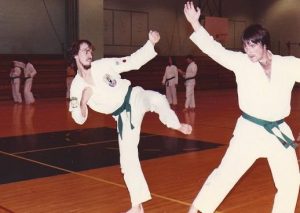
Once a student had practiced the basic movements for a specific period of time, usually months and we felt the basics created the foundation we could build on we introduced application. What is the movement you are doing designed to do? This instruction was instructor led and involved working with a partner. We practiced our blocks, punches, and kicks very slowly with a partner. Some times we were on the offensive and other times we were on the defensive side of each technique.
After foundation established build upon it
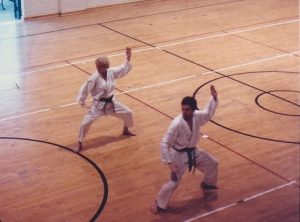
While the new students were learning the basics and how to apply them, the other ranks were learning more advanced techniques and series of movements called Kata’s . The more advanced your belt rank the more advanced your training. All training however was built on a common foundation of basic movements practiced over and over again.
Assessment to understood standards of performance
When your instructor felt you have consistently demonstrated your understanding of techniques for your belt rank you would be tested. The entire club would watch you perform what you have learned and hear the instructor’s comments and suggestions.
Importance of skill level badges
If you passed the test, and some did not, you would be awarded your new belt and the process would start all over again with new techniques demonstrated, explained, you execute them, practice, and the instructors would continuously coach you until you performed behaviors correctly without thinking to the agreed level of performance.
Introduce stress to see use of new behavior
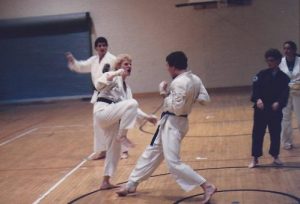
Once you have demonstrated your ability with basic techniques and applied them successfully you will begin sparing. Sparing is a controlled fight to use the techniques you have learned in a live situation. What we are looking for at this phase is does the student apply or try to apply what we have taught? Does the student freeze, and this often happen the first time they step into the ring? Does the student continue to demonstrate control or does their emotions take over in this stressful situation?
Create safe environment for coaching
When I taught it was not unusual the first time a student would move into a live sparing they would spar with me.
Training success is determined by student’s ability to demonstrate
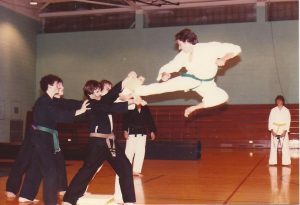
This is not about winning but helping the student feel what it is like to apply what they have learned in a safe and coaching environment.
Ask students to teach other students
Coach
Practice
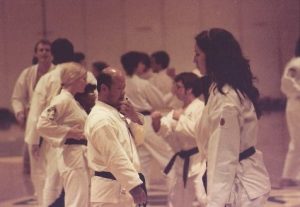
Repeat
Why all this talk about Karate and making sales training stick?
I believe all sales trainers would value taking Karate and learning how to make training stick.
The model traditional martial arts have used for centuries is brilliant.
This is the same model I have used for years when training, coaching and leading salespeople. The only thing I would add today is record your employees being trained and record your coaching in a digital format so they can take with them. As new training skills are introduced and practiced, the student can review the recordings and see their progress over time.
Using this training model helps your sales team own what you are teaching and make the behavior modifications you desire.
Teach me
Show me
Ask me to do it
Have me practice
Coach me
Teach me how to apply new behavior
Test me in a live situation, assess and coach
Follow up training with coaching
Add new skill sets once basics are consistently demonstrated
Break us up into small groups
Have clear training levels, in this case belts and everyone knows what is expected at each level
Today our sales teams need short bursts of teaching followed by how to apply and practice.
If you would like your salespeople to adapt to how buyers want and need to buy today I recommend you implement or hire a sales training company that follows the above methodology.
Does your team need sales training?
What new behaviors would you like to see your team demonstrate?
Does your sales on boarding training build on a foundation of basic skills?
How does your team assess the ongoing future sales training needs of your team members?
How do you currently identify gaps in new sales employee training?
Our markets and buyers are changing how they buy. Our teams must adapt and to help them adapt we must lead training programs that result in new behaviors that meet what our markets and buyers want and need. Implement your own or hire a sales training company that follows the above methodology and your training will stick and you will realize the ROI you desire.
For more information on training adults and trends in training methods please visit some of the following web sites.
Most effective training
Effective training methodology
Sales training do’s and don’t report
Sales effectiveness training

